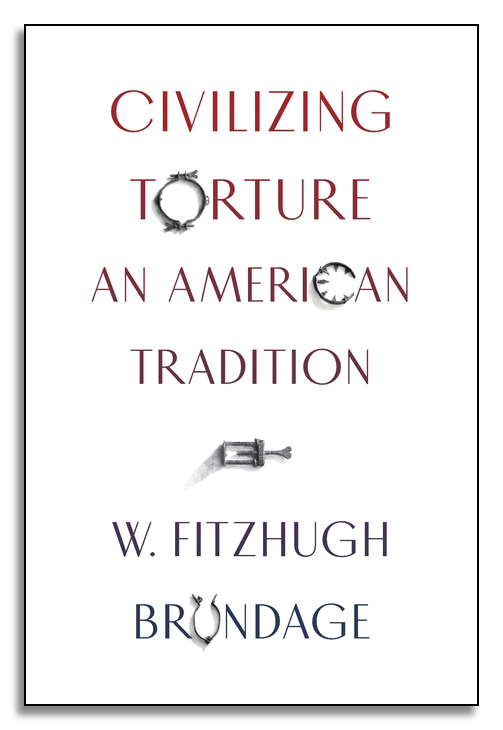Torture: Bad Apples Versus Systemic Abuse
Posted on July 2, 2019
Fitzhugh Brundage set out to answer a caustic question: How do Americans talk about torture? His book became a finalist for the 2019 Pulitzer Prize in history. (Photo by Grant Halverson ’93)
In spring 2004, the news magazine 60 Minutes II aired a graphic segment on the abuse of Iraqi prisoners at the American-run Abu Ghraib prison. Military and political leaders were quick to denounce the behavior as an isolated incident, the work of depraved individuals rather than a systemic problem.
“Under the dictator, prisons like Abu Ghraib were symbols of death and torture,” President George W. Bush said in a speech after the abuse became public. “That same prison became a symbol of disgraceful conduct by a few American troops who dishonored our country and disregarded our values.”
Sen. John McCain, who had been a victim of prolonged torment as a prisoner of war in Vietnam, fiercely denounced detainee mistreatment as fundamentally un-American. “If we’re going to get the high ground in this world and we’re going to be the America that we have cherished and loved for more than 200 years … we’re not going to torture people,” he said during the 2008 presidential race.
Watching the debate unfold, UNC historian Fitzhugh Brundage saw a familiar pattern. “I realized that we were avoiding the complexity,” he said. “When torture happens, it’s somehow antithetical to who and what we are. If torture happens, it’s obviously the work of a few bad apples. And I’m sympathetic to that view; I would much rather be a member of a nation where torture is something that’s beyond common experience.”
But Brundage is a scholar of slavery and Reconstruction. He has spent years digging into the history of lynching in the United States, and the densely packed shelves in his Hamilton Hall office are filled with titles like Polemical Pain: Slavery, Cruelty, and the Rise of Humanitarianism.
“I have a kind of dark view of human nature,” Brundage said. “I think when people have extraordinary power over other people, they will often abuse it.”
 So he set out to answer a caustic question: How do Americans talk about torture? “This was not a topic that my wife was excited about. No one is going to buy this book and put it on their coffee tables.”
So he set out to answer a caustic question: How do Americans talk about torture? “This was not a topic that my wife was excited about. No one is going to buy this book and put it on their coffee tables.”
It may not be coffee-table decor, but Civilizing Torture: An American Tradition became a finalist for the 2019 Pulitzer Prize in history. “By tracing the historical debates about the efficacy of torture and the attempt to adapt it to democratic values, Civilizing Torturereveals the recurring struggle to decide what limits Americans are willing to impose on the power of the state,” the Pulitzer committee wrote.
That recurring struggle is what interests Brundage. “I think torture poses a particular problem for any democracy,” he said. “It goes to the heart of how to preserve democracy in the face of threats.”
Digging into centuries of archives, from Colonial encounters with Native Americans to post-9/11 military records, Brundage wanted to know what happens when certain populations are considered outside the protection of American law. How the country dealt with people on the margins of society — prisoners, Native Americans on the frontier, slaves and criminal suspects — sheds new light on our current controversies.
In today’s war on terror, there are echoes of the Philippine-American War at the turn of the 20th century. There are common threads between the 19th-century rhetoric about penitentiaries and modern debates about criminal justice reform.
Brundage’s chapter on police interrogation — citing the often gleeful newspaper coverage of suspects getting “the third degree” from interrogators until they confessed — gives fascinating context to the contemporary fight over police conduct. Almost all of the protections for criminal suspects we now take for granted came about in response to police abuses.
“Among the legal innovations of the twentieth century, the federal regulation of criminal procedures ranks among the most transformative,” Brundage writes. “The Court incrementally made the protections of the Bill of Rights binding on the states and established judicial restrictions on coercive interrogation in the United States.”
Civilizing Torture is nobody’s idea of a beach read, but Brundage is careful to tell the stories of people who fought for the nation’s core ideals. His point isn’t that Americans are uniquely bad — it’s just that we aren’t innately good, either. That’s why democracy takes courage.
“There are definitely voices of humanity, very powerful voices, in this story,” Brundage said. “One of the inspiring and hope-giving aspects of my research is that at every moment there has been a public debate about torture in the United States, there have been very conscience-driven and highly articulate critics of torture. And they’ve made their arguments in the face of sometimes withering criticism.”
Brundage hopes the book can be a resource for the next generation of advocates fighting against abuses of power. The sobering lesson of Civilizing Torture is that those voices are always needed; the debate about who deserves legal protection always takes new forms.
In a May op-ed for The Washington Post, Brundage wrote about the “get-tough” language directed at immigrants and border enforcement, highlighting the way vague rhetoric about detention and deterrence can mask what’s actually happening to migrants.
“By seeing violations of human rights as rare exceptions, unfortunate lapses that don’t challenge our fundamental sense of decency, Americans can avoid any real reckoning with the policies we’ve approved — which often violate our purported values,” he wrote. “Focusing on bad apples has long allowed us to excuse morally bankrupt policies.”
Torture and civilization are old ideas, but they’re always posing new questions.
— Eric Johnson ’08
Thanks for reading the Carolina Alumni Review
Carolina Alumni members, sign in to continue reading.
Not yet a member? Become one today.
